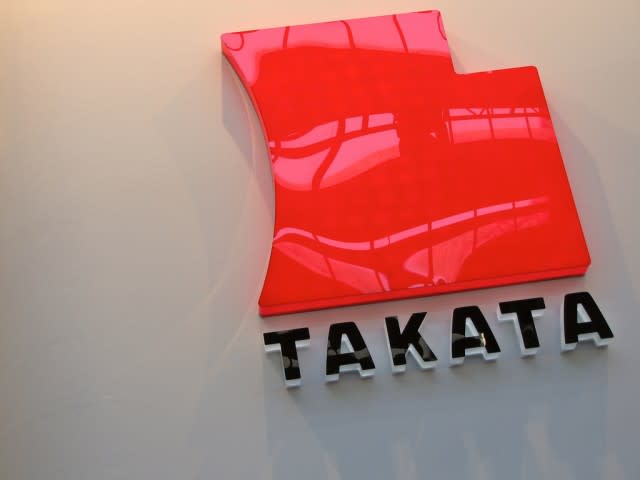Has Takata finally found a buyer?

It's been over a month since we heard about Takata's proposed billion-dollar settlement to end an investigation by U.S. officials into charges of criminal wrongdoing. Yesterday in Detroit, District Court Judge George Steeh formally approved that proposal.
Most of the funds that Takata ponies up--around $850 million--will be allocated to automakers to help them pay for costs associated with the long, drawn-out recall of fatally flawed airbags. Another $125 million will go to Americans injured by the devices or, in the case of those killed, to their families. The remaining $25 million will be paid to the federal government in the form of fines.
The good, the bad
As expected, the good news is that part of the settlement involves a formal guilty plea: Takata will admit to hiding evidence of failed airbag inflators for some 15 years. That could give individuals and organizations suing the company plenty of leverage in court.
The bad news is--at least according to some observers--the settlement complicates the question of whether automakers are partly to blame for the widespread use of Takata's airbags.
Lawyers representing vehicle owners injured by Takata's exploding airbag inflators and family members of the deceased say that car companies knew of the devices' flaws but used them anyway because they were cheap. By placing blame for the airbags solely on Takata, the settlement makes it harder for lawyers to sue automakers for damages.
Not surprisingly, automakers categorically deny that they knowingly used unsafe devices in their vehicles.
What now?
Judge Steeh said that he could've fined Takata up to $1.5 billion, but that doing so would've likely pushed the precariously positioned company over the edge, into bankruptcy. That would've caused delays in the supply of replacement airbag inflators needed to carry out the largest automotive recall in U.S. history.
That's not so say, however, that Takata won't restructure. In fact, the company's chosen buyer, Key Safety Systems, would really, really like to see Takata go through bankruptcy before it signs on the dotted line. If Takata doesn't do so, Key's investment could be at risk in any number of civil lawsuits against Takata.
Will Takata take the plunge and agree to restructuring? Or will it stick to its guns and protect its current investors, over the objections of nearly everyone else? Stay tuned.
After months of searching, beleaguered Japanese supplier Takata may have finally found its knight in shining armor. Insiders report that Chinese-owned, U.S.-based Key Safety Systems is slated to be the company's lucky buyer.
Or rather, we should say "preferred buyer". While Key Safety Systems may be Takata's pick, the devil will be in the details of any buyout deal.
Bankruptcy barrier
One of those details will certainly be the restructuring of Takata. Most of the company's potential buyers have wanted Takata to file for bankruptcy and restructure in order to protect their investments. If Takata doesn't do that, any buyer will be exposed to untold numbers of lawsuits over the company's fatally flawed airbags.
To date, those airbags have been conclusively linked to 16 deaths and more than 180 injuries worldwide. They're also responsible for the largest recall in automotive history, with 42 million U.S. vehicles needing to have their airbag inflators replaced. (If you want a refresher on the technical problems with Takata's airbags, grab a cup of coffee and click here.)
Between all the government fines, investigations, replacement parts, and legal fees, the Takata airbag fiasco is expected to cost the company more than $10 billion. Unfortunately, Takata is only valued at $450 million. That's where the buyer comes in.
Any buyer stands to make a decent profit on Takata. Though the company's value is low, it generates around $5.4 billion in annual revenue. A thoughtful pairing--one that takes advantage of economies of scale, as the deal with Key Safety Systems would--could prove a massive win for the new owner.
Takata pushes back
Unfortunately, Takata is very, very resistant to the idea of restructuring--particularly a court-ordered restructuring. Why? The company has said that restructuring would interrupt its operations at a time when continuity is especially important. Perhaps most importantly, a court-led bankruptcy would disrupt Takata's ability to pay its suppliers and hamper its efforts to churn out new and replacement airbags.
However, there's a more selfish reason that Takata is fighting the idea of a court-led bankruptcy: such a restructuring would cause Takata's stock value to plummet. That's of particular concern to the Takada family, who founded the company and remain major shareholders.
If it's forced to restructure, Takata would rather go through the process out-of-court, where it could have more control over the process--and over what gets shared with the public. Following that path could also potentially contain the restructuring, limiting it, for example, to Takata's U.S. subsidiary, TK Holdings.
That alone could shield Takata (and any would-be buyer) from many potential lawsuits, since roughly one-third of Takata's business is done in the U.S., and the vast majority of deaths caused by its airbag inflators occurred in America.
Takata may not get its wish, though. Like many automakers who've weighed in on the potential Takata deal, Key Safety Systems favors a court-led restructuring process that includes both Takata and TK Holdings.
The steering committee tasked with identifying the best possible buyer for Takata announced that it had chosen Key Safety Systems as the buyer of choice. Though Takata has denied that any final decision has been made, the news caused Takata shareholders to panic, resulting in a massive stock sell-off. At the end of the trading day in Tokyo, shares had fallen by 20 percent, and Takata's total value had been reduced to $322 million.

 Yahoo Autos
Yahoo Autos 
